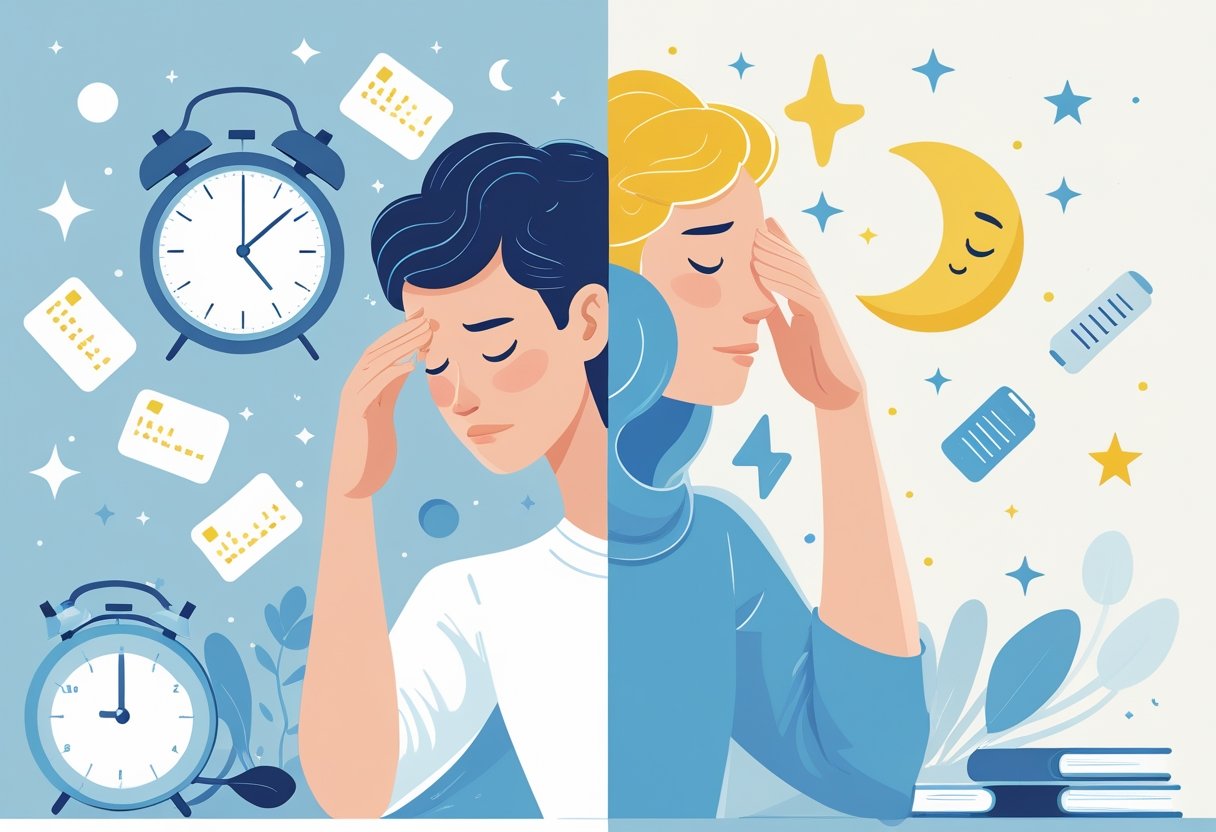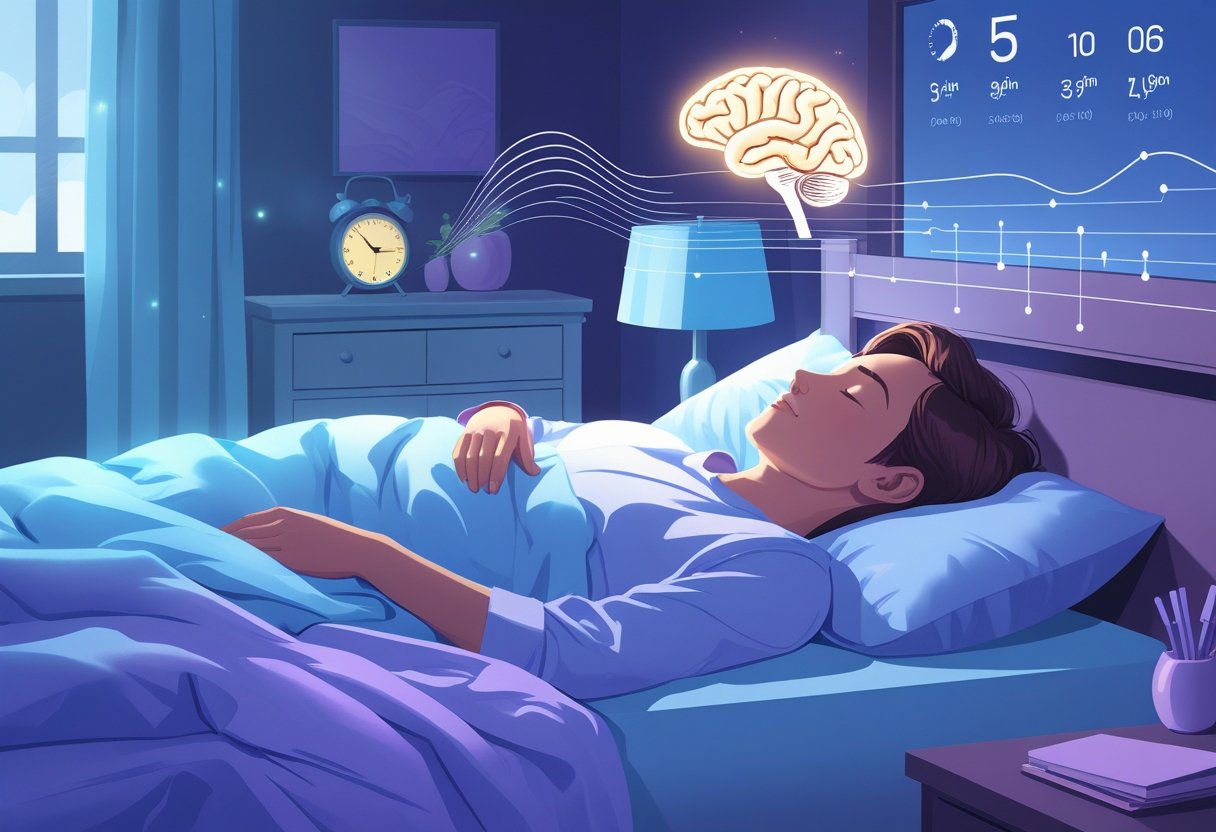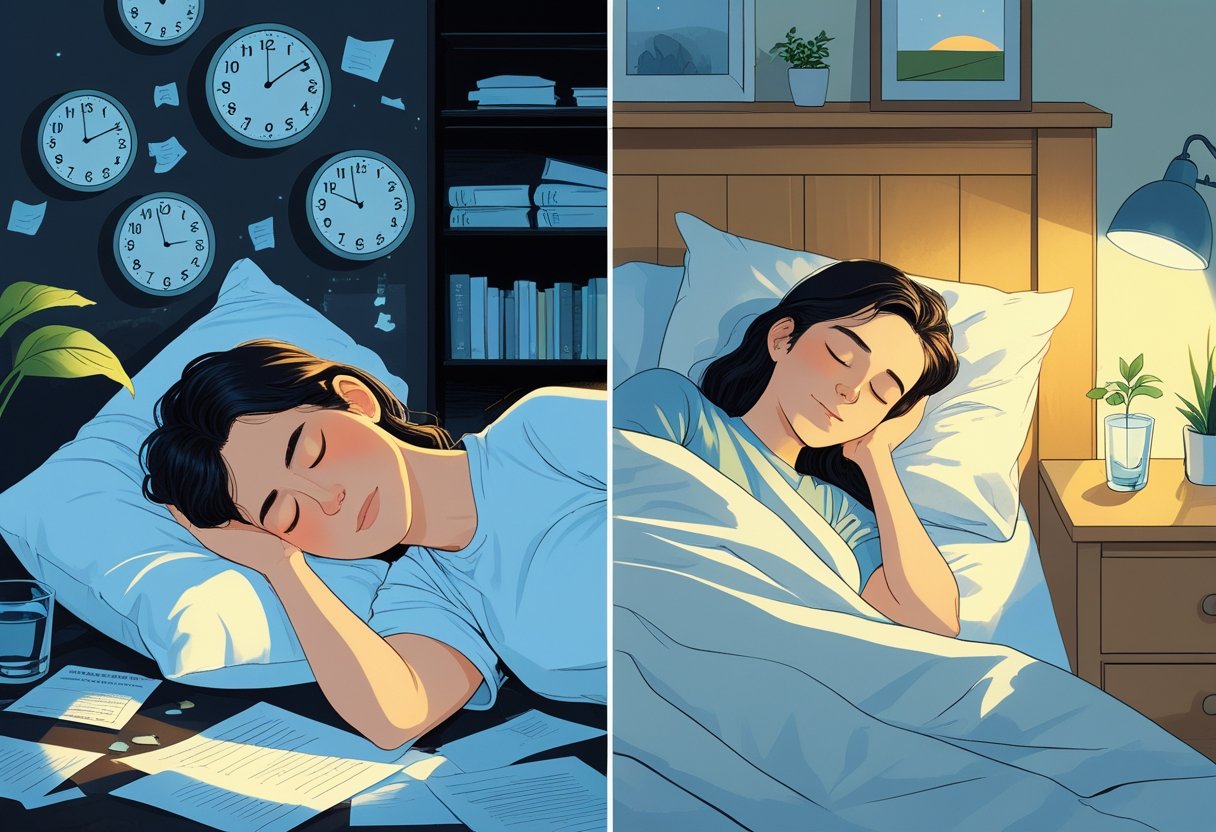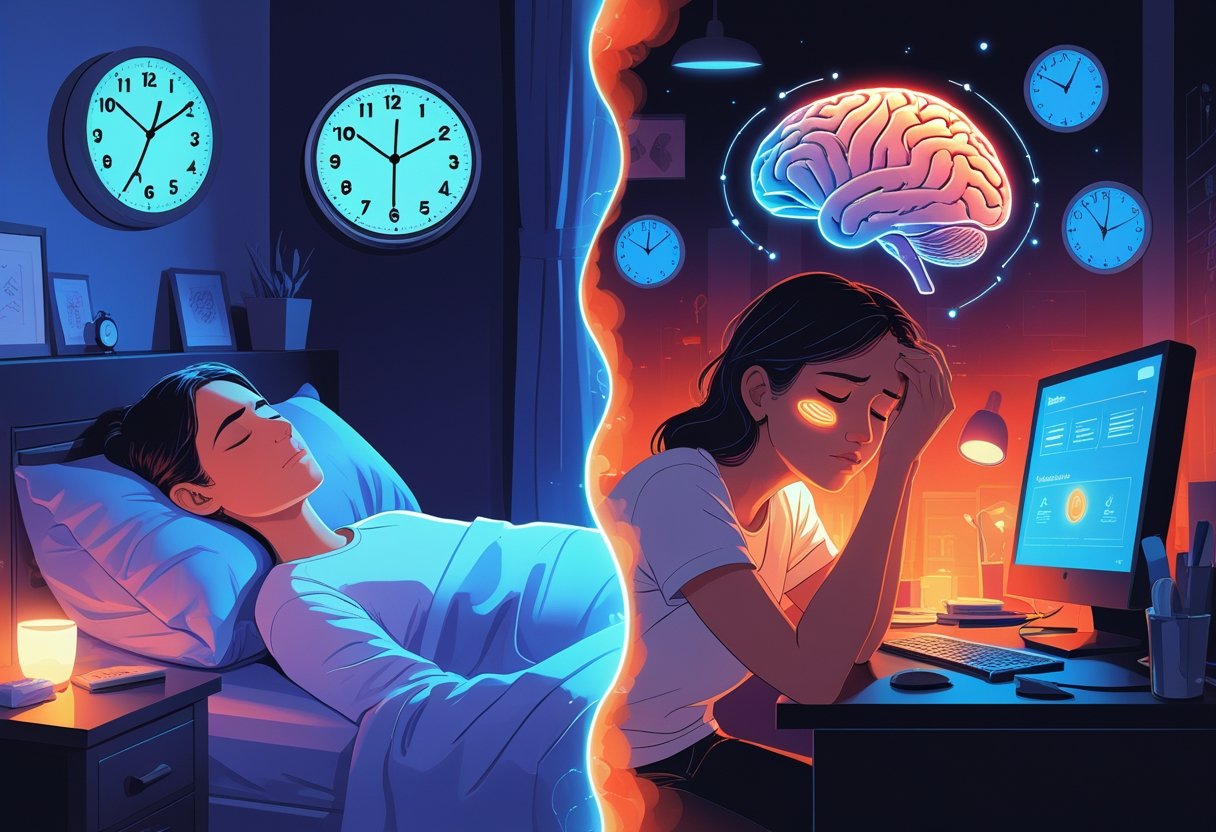Losing sleep during the week happens to many, and people wonder if they can make up for that lost rest. Although sleeping more on days off can recover some lost sleep, it won’t completely fix the problem or erase the effects of ongoing sleep loss. Catching up may reduce some tiredness but cannot fully reverse the damage caused by chronic sleep deprivation.
The concept of “sleep debt” explains why lost sleep accumulates over time and why a few extra hours on the weekend fail to restore full energy or health. Maintaining regular and healthy sleep habits is essential in preventing sleep deficits and supporting overall well-being. Those who rely solely on weekend catch-up often experience irregular sleep schedules, which makes getting quality rest more difficult.
Knowing how to manage lost sleep helps improve daily functioning and mood. Finding the best ways to repay sleep debt while keeping a steady routine proves essential for better long-term health and alertness.
Key Takeaways
- Lost sleep can be partially recovered but not fully erased by weekend catch-up.
- Consistent sleep routines matter more than occasional extra sleep.
- Building good sleep habits helps avoid ongoing sleep problems.
- A mattress that has proper support and temperature control can enhance restorative sleep and speed up recovery from lost rest.

Understanding Sleep Debt and Sleep Deficit

Sleep debt occurs when a person sleeps less than their body requires over time. It accumulates gradually and can impact health and daily performance. Understanding how sleep debt builds and whether it can be fully repaid proves important for managing sleep and preventing long-term problems.
What Is Sleep Debt?
Sleep debt refers to the total amount of missed sleep resulting from regularly failing to get enough rest. For instance, if a person needs 8 hours but only sleeps 6, they create a 2-hour sleep debt for that night. This debt increases each day if the sleep loss continues.
Sleep debt may arise from everyday activities such as working late, socializing, or simply neglecting to prioritize sleep. It causes tiredness, diminished focus, and weakened immune function. The longer insufficient sleep persists, the larger the debt becomes.
Is Sleep Debt Real?
Sleep debt is real and widely recognized by sleep experts and researchers. Scientific studies demonstrate the effects of prolonged insufficient sleep on the body and brain. People feel more fatigued than usual and experience slower reaction times due to accumulated sleep debt.
Nonetheless, the idea that extra hours of sleep on weekends completely erase sleep debt tends to be exaggerated. Although catching up on lost sleep alleviates some effects, it may not fully reverse all the negative consequences caused by several days or weeks of insufficient rest.
How Does Sleep Debt Work?
Sleep debt functions like a balance sheet: lost hours accumulate as “debt” that requires repayment. The body attempts to recover by increasing sleep time and improving sleep efficiency during subsequent rest periods. Still, repaying a large sleep debt can take several days of good sleep.
Naps and additional sleep on days off assist in reducing sleep deficit. However, they might not repair disrupted sleep patterns or other health issues. Consistently obtaining sufficient nightly sleep remains key to avoiding chronic sleep debt rather than relying on catch-up sleep.
Key Points
- Sleep debt refers to accumulated lost sleep over time
- Causes include daily insufficient sleep and busy schedules
- Effects involve fatigue, reduced cognition, and health risks
- Repayment requires extra sleep, but full recovery takes time
- The myth that catching up on sleep fully restores lost function quickly does not hold true
The Science of Catching Up on Sleep
When someone misses sleep, the body builds up what’s known as sleep debt. Catching up means repaying this debt by getting extra rest afterward. One night of extra sleep isn’t enough, as recovery takes time and depends on how much rest was lost.
Can You Actually Catch Up on Sleep?
Yes, it’s possible to catch up on missed sleep to some degree. After losing sleep, the body craves deeper, longer rest. This recovery sleep helps restore focus and supports both mental and physical function. Many people try to make up for lost sleep by napping or sleeping longer on weekends.
Still, catching up isn’t a perfect replacement for a consistent sleep routine. Recovery sleep may offer relief, but it doesn’t instantly reverse the effects of long-term sleep debt. The brain and body need time to repair the damage caused by ongoing sleep loss.
How Long Does It Take to Recover?
Recovery time depends on how much sleep was lost and how restful the next nights are. Some studies suggest it may take up to four nights of quality sleep to make up for just one hour of missed rest. For heavier sleep debt, full recovery could take several days of consistent and uninterrupted sleep.
Experts advise against letting sleep debt build up, since catching up takes time. Sticking to healthy sleep habits every day helps avoid major deficits and shortens the recovery period after late nights or restless sleep.

Best Strategies to Make Up for Lost Sleep
Making up for lost sleep takes focused effort both at night and during the day. Sleeping earlier and taking short naps help reduce sleep debt and boost alertness. Long-term recovery depends on consistency and solid sleep habits.
Effective Ways to Catch Up on Sleep
To recover lost sleep effectively, prioritize getting extra rest over several nights instead of relying on one long sleep session. Adding 1–2 more hours of sleep each night eases sleep debt without throwing off your usual schedule. Sleeping earlier gives your body time to restore itself naturally.
Improving sleep quality matters just as much as increasing hours in bed. A dark, quiet, and cool room promotes deeper rest. Reducing screen time and caffeine before bed also supports faster sleep cycle repair. Avoid big changes in your sleep routine, as they can confuse your internal clock. Keeping consistent bed and wake times improves recovery and helps stabilize your sleep pattern, lowering the risk of long-term sleep issues.
Role of Naps in Sleep Recovery
Naps help make up for missed sleep by lifting your mood, sharpening focus, and improving cognitive function. Short naps, around 20 to 30 minutes, work best to avoid grogginess and keep your nighttime sleep intact.
Still, naps don’t replace the benefits of a full night’s rest. They are better when nighttime sleep is lessened, like during hectic weeks or shift work. To get the most from naps, aim to nap early in the afternoon. Napping too late or too long can disrupt your evening sleep.

Long-Term Sleep Deprivation and Recovery
Long-term sleep deprivation affects both the brain and body in serious ways. Recovering from years of poor sleep takes time, consistency, and more than just sleeping in on weekends.
Recovering from Years of Sleep Debt
Missing sleep for years leaves lasting effects. The brain struggles to process information, which raises the risk of memory loss, mood swings, and poor focus. Getting back on track means sleeping enough every night, regularly, for weeks or even months.
Sleeping in on the weekend may provide short-term relief, but it won’t undo years of lost sleep. A consistent routine with 7 to 9 hours of sleep each night matters more. Quality also counts, not just the number of hours in bed.
Chronic Sleep Loss: Can It Be Undone?
Chronic sleep deprivation strains nearly every system in the body. It increases the likelihood of depression, anxiety, and even neurodegenerative conditions like dementia. While some damage may not be fully reversible, stopping further harm remains possible.
Gradually catching up on rest improves mood and alertness, though some cognitive issues may linger. Research shows that regaining normal brain function can take several days or even weeks of healthy sleep. Maintaining good sleep habits and managing stress helps the body recover over time.

The Impact of Irregular Sleep Patterns

Irregular sleep patterns affect how the body functions from day to day. Missing just a few hours of rest builds a sleep backlog that drains energy and impacts overall health. A consistent sleep routine plays a major role in managing this.
Short Nights and Sleep Debt
Getting only 1 to 3 hours of sleep in one night leads to significant sleep debt. This happens when the brain and body miss out on the rest needed to recover. Even if someone doesn’t feel tired after just 2 hours, their body still lacks deep, restorative sleep.
Without proper rest, focus and memory decline. The metabolism slows, and the immune system weakens. Making up sleep on weekends offers some relief, but it won’t fully undo the effects of constant short nights. Over time, this leads to low energy and poor judgment.
The Importance of a Consistent Sleep Schedule
To avoid sleep debt, regularity in sleep matters most. Going to bed and waking up at the same time each day helps the body’s internal clock stay in sync. This builds better sleep quality and helps prevent fatigue during the day.
Irregular routines, like sleeping less on weekdays and trying to recover on weekends, disrupt the body’s natural rhythm. This causes problems with metabolism and makes falling asleep harder. A consistent sleep pattern supports immunity, heart health, and digestion.
Simple steps like setting a fixed wake-up time and winding down at night help reset the body’s rhythm. To feel better and stay healthy, the body needs enough sleep and a stable routine.
How Mattresses Influence Sleep Debt and Recovery
Mattresses affect how a person recovers from sleep debt. A supportive mattress aligns the body properly and reduces discomfort that might cause waking during the night. Poor sleep from an uncomfortable bed makes it harder to catch up on rest.
The right mattress encourages consistent, high-quality sleep, which helps reverse the effects of sleep loss. People who switch to a more comfortable and supportive option often notice fewer disruptions and deeper rest. Some hybrid mattresses, such as the Leesa Sapira Hybrid, combine foam and coils to provide pressure relief and stability, which is ideal for sleepers who experience aches or tend to overheat at night.
Sleep experts suggest paying attention to:
- Firmness: Should align with your preferred sleeping position.
- Material: Options like memory foam, latex, or hybrids provide varying levels of pressure relief.
- Temperature control: Cooling mattresses prevent overheating and support better sleep quality.
The Leesa Sapira Hybrid features a ventilated comfort layer that promotes airflow and helps maintain a cooler sleep surface, combined with individually wrapped coils for strong edge support and responsiveness. Many sleepers noticed reduced pressure on hips and shoulders along with noticeable relief from back pain after a brief break-in period. With a 100-night trial and a 10-year warranty, it’s a risk-free option to improve sleep quality while addressing common issues that disrupt rest.

Frequently Asked Questions
Sleep debt can be partially repaid through rest, but the process depends on the situation. Recovering from sleep loss requires deliberate changes in sleep habits and time, based on how much sleep was missed.







